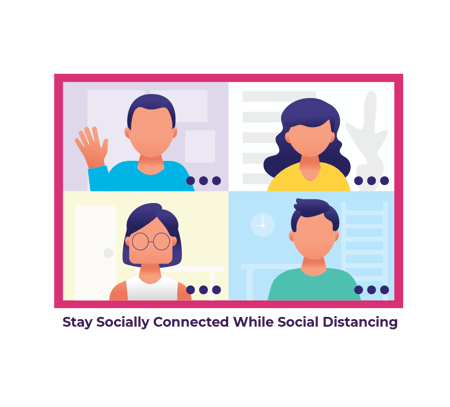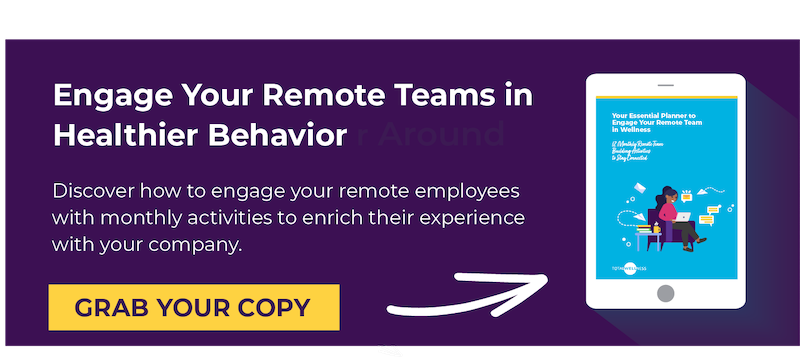 For many, the depletion of social health has been one of the largest psychological challenges of dealing with the COVID-19 pandemic.
For many, the depletion of social health has been one of the largest psychological challenges of dealing with the COVID-19 pandemic.
In May, Pew Research Center reported a third of Americans felt high levels of psychological distress during a two-month social distancing period.
In an era that's rapidly changing social connections for individuals, now more than ever it's important for employees to maintain their social health. Those who are socially well often live longer and enjoy better health.
The more researchers look into it, the more they’re finding a tie between good social health and overall well-being. Plus, it means employees are generally happier which is never a bad thing!
Socially healthy employees are:
- Less stressed
- More productive
- Healthier overall
- Serve their company better
- More creative and resilient
- Have more self-confidence
- More loyal to their company and coworkers
Ready to learn more about social health and how to encourage it in the workplace? Read on!
What is Social Health?
Social health is the ability of individuals to form healthy and rewarding interpersonal relationships with others.
Good social health looks like:
- Adapting to social situations
- Staying true to yourself in all situations
- Balancing your social and personal time
- Being engaged with others in your community
- The ability to develop and maintain friendships
- Creating boundaries in friendships and relationships
- Having a supportive network of family and friends
Social health is considered a pillar of wellness as it relates to how comfortably we can adapt in social situations and includes our support structure to get through life’s challenges.
The Impact of Poor Social Health on Physical Health
You may have noticed that when you’re feeling down and out, that your physical and mental health suffers. During those periods, if you shied away from connecting with others, you also likely felt more of an impact on your overall health.
Poor social health can cause a variety of health issues including:
- Inflammation
- Heart disease
- High blood pressure
- Suppressed immune system
- Chronic health conditions
- Mental health issues like anxiety
Research shows the quality and quantity of relationships have an effect on mental and physical health. Loneliness, it turns out, can even be more dangerous than smoking, according to research by the Indian Journal of Psychiatry.
In older adults, it’s even more cause for concern. And that’s not just taking retiree-aged individuals into account. A recent 2020 National Academies of Sciences, Engineering, and Medicine (NASEM) report found that more than one-third of adults aged 45 and older feel lonely. Of those 65 and older, nearly one-fourth of that population fall into the category of “socially isolated.”
Alone vs Loneliness
It’s important to know that while uncomfortable, there is a distinct difference between being alone and chronic loneliness. A 2019 Psychology Today article by psychotherapist Amy Morin reported that loneliness isn’t only bad for one’s mental health, but it can send someone to an early death.
The comparison is that being chronically lonely is the equivalent of smoking 15 cigarettes daily. Being alone is different, though, and can be good for one’s health.
The difference:
- Being alone at times is good for you - Solitude offers time to reflect and take pause. It also may help improve your mental health and relationships, boost creativity, and help you plan for the future.
- Loneliness looks different - When being alone isn’t a choice, it can become loneliness and may become a health concern, especially if it leads to depression. This may include the death of a spouse, for example.
The Effects of Social Media on Mental Health
In an effort to avoid alone time, you may turn to social media. This often has the opposite effect intended when you get caught up in comparisons and/or superficial relationships, research shows.
Studies report the effects of social media on mental health are significant as it can make people feel more disconnected and lonely.
Social health means also discovering what authentic relationships feel like. Individuals can still feel lonely when not alone since being with people doesn’t ensure that you feel connected or accepted. That’s where the idea of quality versus quantity comes into play.
Building Friendships of Quality Over Quantity
In an era where social likes and “new friends” on social media may look like someone is winning the popularity contest, it doesn’t mean they actually are. Having a ton of friends on social media doesn’t ensure or even promote high-quality relationships — a key requirement for balanced social health.
As humans, we need significant, close interpersonal connections to be socially healthy. That’s why social distancing — and its extensions — have been hard for so many. We thrive on being able to connect and socialize with our closest people.
But it’s also been shown that video conferencing can step in as a sort of interim consolation when individuals aren’t able to visit their network in-person. In a 2018 study BMC Geriatrics study, older individuals in care environments found video calls reduced loneliness.
How to Encourage Social Health at Work
Like other aspects of health, good social health takes time and effort. As we come back from our pandemic isolation and reset, it’s an ideal time to reevaluate improving it.
In the workplace, consider how you can help your employees feel connected over passions other than work. Relationships can’t be forced, obviously, but think of the good it would do them to authentically build their social network.
Ways to encourage socially-healthy employees:
- Celebrate events together - Gather around once a month to celebrate special occasions like birthdays, work anniversaries, milestones, and hitting team goals.
- Go beyond happy hour - Encourage non-work meetings to get to know each other. Coffee breaks and team-building activity days can bring your team together in a socially healthy way.
- Break bread together - It may still be via Zoom, but sharing meals is a great way for people to connect. If you can do it in person, consider hosting a lunch and learn event with a social hour before or after.
- Create group wellness programs - Connect your team socially for physical health perks, too. Put together fitness and wellness challenges to support employees in a variety of ways as a team.
- Set up opportunities for cross-team/department gatherings - Don’t let departments feel divided. While people in different departments may not get to interact often, help them get to know each other. Board games in the break room, meditation Monday gatherings, etc. are a great way to connect your teams in a low-pressure way.
So, what is social health? In a nutshell, keeping your employees socially connected and in healthy relationships with others. The above are just a few ways to rebuild that important emotional aspect of health coming out of pandemic lockdowns.
As you may have experienced during the pandemic, the need for social interaction with others is real. As your team reconnects — whether in-person or afar — take this opportunity to reset and refocus intentionally on improving social health opportunities in the workplace.
Want to keep your team feeling connected even from afar? Check out our free downloadable guide: The Ultimate Resource Guide for Remote Teamwork & Wellness Success. In it, you’ll find a collection of resources and tips to keep your teammates feeling connected no matter how far apart they may be.



